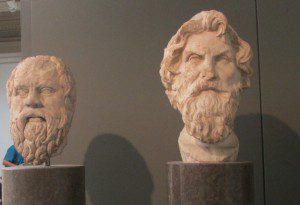 Theories about education, Joseph Epstein announces in an echo chamber inhabited by the alert, “fizzle, then go down in flames” because they are foisted upon the unsuspecting student by “lunatics of one idea.” When the new idea rises to a sound loud enough to be heard by edu-crats, everything is asked to march behind — of late we’ve had learning styles, which has proven to be a bust, and outcome based education, which because it just must be measured with numbers snaps its tether to what matters most but which when done with the right aims in view can sizzle.
Theories about education, Joseph Epstein announces in an echo chamber inhabited by the alert, “fizzle, then go down in flames” because they are foisted upon the unsuspecting student by “lunatics of one idea.” When the new idea rises to a sound loud enough to be heard by edu-crats, everything is asked to march behind — of late we’ve had learning styles, which has proven to be a bust, and outcome based education, which because it just must be measured with numbers snaps its tether to what matters most but which when done with the right aims in view can sizzle.
We are treated yet again to another volume of essays by Joseph Epstein in A Literary Education, essays that sparkle and pop on each page, essays that ought to be read one essay per week or if you have a more leisured life, one per day, and essays that will irritate the spine of the social conscious liberal for whom education is the fast path to social engineering. Not so for Epstein.
Epstein’s theory of education, one that reverberates with my own, is expressed in this sentence about Pascal: “Saint-Beuve said of Pascal, who was an authentic genius, — and here’s what I’m pointing at — that ‘it was easier for him to make discoveries for himself than to study after the way of others'” (8).
The others is the way of the “good student,” who asks but one all-absorbing question: What does this teacher want? The good student gives it to him or her, regardless of the teacher’s ideologies — feminism, Marxism, conservative, and the absent-of-ideology professor. In other words, the good plays the game well enough to know what to say and when to say it.
The one chasing wisdom does not ask what the teacher wants, but instead What is life about? or What do I see here about God, about others, about myself, about how the world works?
Epstein’s theory is that education, the best kind of education, has an element of randomness and the accidental. He came to the conclusion as an English student, and not all that good of one (he was not the “good student”), that the path to life and reality was the way of great literature, especially the novel. Why the novel? Because it deals not with ideas but with the complex realities of life. He loves what T.S. Eliot said of Henry James: he “had a mind so fine no idea could violate it” (12). That is, ideas and ideology did not drive the novel but realities and those realities said to the ideas, Nice try, buddy, but not good enough. Life ain’t that simple.
The job of a school then is to point the student in the right direction and create the opportunity to see what is there. Ideas will crush realities but it is realities in which we live. Here’s his point, just to underline what he’s driving at:
One of the reasons for anger at the theory-ridden English departments of our day is that they sold out the richness of literature for a small number of ideas — gender, race, class, and the rest of it — and hence gave up their cultural birthright for a pot of message (15). #bam
That is, “for the person of literary education, all ideas, as Orwell felt ought to be the case with all saints, are guilty until proven innocent” (18).











